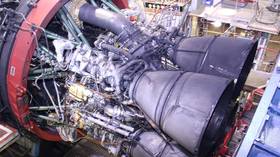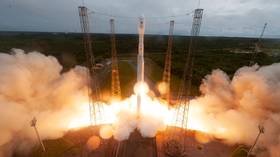
Roscosmos has announced production of the first sample of the RD-171MV engine for the Soyuz-5 launch vehicle

The first flight engine RD-171MV for the Soyuz-5 © Roscosmos
The Energomash Research and Production Association has successfully completed production of the first sample of the RD-171MV liquid fueled rocket engine, which is said to be more powerful than any other similar propulsion system in the world.
Russia’s state space corporation, Roscosmos, announced the completion of the construction on Friday, noting that the rocket will be used for the first flight tests of the new Soyuz-5 launch rocket.
The organization said that this year, it also plans to complete the assembly of the RD-171MV for a second carrier and produce an engine for a third one as well. The company added that Energomash has also successfully manufactured, tested, and debugged two additional RD-171MVs which are designed for final finishing tests, noting that over two dozen fire tests of the engine have been carried out so far.
“The next stages of the program will be interdepartmental tests of the RD-171MV and the serial supply of engines for Soyuz-5 missiles,” the state corporation said.
Roscosmos noted that the RD-171MV, which is a modified version of the 2001 RD-171M engine, will form the basis of the new Soyuz-5 and that the thrust of the engine exceeds 800 tons, making it the most powerful in the world.

Read more
The Soyuz-5, also known as Irtysh, will have two stages and is expected to launch from the Baikonur space station in Kazakhstan. The rocket will be able to deliver up to 17 tons of cargo to space, and its primary function will be delivering automated space devices to various near-Earth orbits, according to Roscosmos.
Meanwhile, Europe has faced issues in its space operations amid the conflict between Moscow and Kiev. The sanctions placed on Russia’s space industry have deprived European space companies of Russian Soyuz rockets. After a failed launch of the Vega-C in December, which was reportedly due to a faulty Ukrainian-made part, European space companies have faced even more limited availability of cargo capacities for commercial satellite launches.




